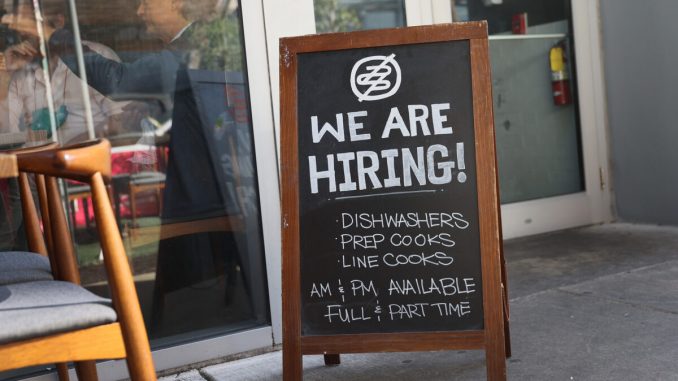

Job searches jumped by 5 percent in 22 Republican-led states on the day each announced it was moving to end the Biden administration’s pandemic unemployment benefit boost, a Thursday analysis shows, suggesting a link between the jobless compensation top-up and peoples’ interest in looking for a job.
While the analysis, authored by Jed Kolko, Chief Economist at the Indeed Hiring Lab, notes that the increase in job searches was “temporary, vanishing by the eighth day after the announcement,” it may be viewed as an arrow in the quiver of those who contend that generous unemployment benefits are creating a disincentive for people to take up jobs.
“It is, of course, still unclear how this temporary boost in search activity will affect hiring or wages,” Kolko wrote in the analysis. “And the premature end of these benefits in June and July could well have a different effect on search activity, hiring, and wages than these announcements in May did,” he added.
A possible factor as to why the effect faded quickly is media buzz around the date of the announcement, as well as the opt-outs of the supplemental federal unemployment programs are not due to come into force until June or July. Kolko told the Washington Examiner that there could be a jump in job searches when the benefits actually expire.
“It depends how aware people are for starters, but I think even more importantly it depends on how much else is going on with the labor market and the pandemic that might also affect peoples’ search behaviors,” Kolko told the outlet.
Kolko’s analysis also showed that from announcement day to three days later, a state’s share of national job search clicks was up on average between 3 and 4 percent, relative to the national trend, before dropping back down to the April baseline on day eight.
At least 24 GOP-led states have in recent weeks announced that they are moving to cut the enhanced unemployment benefits, with some limiting the rollback to ending the $300 federal weekly top-up, which is over and above state unemployment benefits.
Florida, for example, is ending the $300 supplement but maintaining its participation in other federal programs—Pandemic Unemployment Assistance, Pandemic Emergency Unemployment Compensation, and Mixed Earners Unemployment Compensation—which all expire in September.
The degree to which the federal weekly unemployment boost is creating a disincentive for people to take jobs has become a matter of heated debate. Business groups and Republican leaders argue that the payments are having a substantial impact, while members of the Biden administration—including President Joe Biden and Treasury Secretary Janet Yellen—argue that the impact is negligible, blaming the hiring crunch on factors like child care needs amid pandemic-driven school closures.
“The disincentive effect of these benefits is very hard to measure since they coincide with numerous other factors potentially affecting labor supply, like health risks, caregiving challenges, and eagerness to enjoy a vaccinated, reopened summer,” Kolko noted in the analysis.
To date, Alabama, Alaska, Arizona, Arkansas, Florida, Georgia, Idaho, Indiana, Iowa, Mississippi, Missouri, Montana, Nebraska, New Hampshire, North Dakota, Ohio, Oklahoma, South Carolina, South Dakota, Tennessee, Texas, Utah, West Virginia, and Wyoming all plan to end the $300 boost ahead of its expiration in September, while at least 19 of the states also plan to opt out of the other federal unemployment benefit programs.
Republican leaders in the states that are opting out of the federal unemployment programs have said they are responding to the hiring woes of businesses that have been complaining about a lack of workers to fill available jobs.
A recent report from the National Federation of Independent Business—the largest small-business lobby group in the United States—found that a record number of small businesses couldn’t find enough workers to hire in April, even as the number of job openings in the U.S. economy surged to 8.1 million in March, the highest number in the history of the Labor Department’s reporting on the statistic.






Be the first to comment